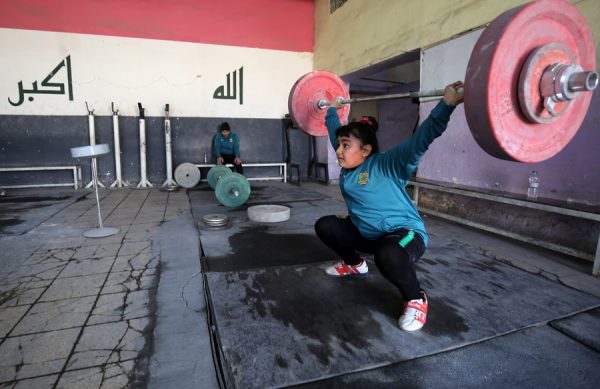
The weightlifters on Iraq’s national women’s team train hard every day, both to bring home the medals and to help ease the financial burden of running a home.
/ AFP PHOTO / AHMAD AL-RUBAYE
BAGHDAD – The weightlifters on Iraq’s national women’s team train hard every day, both to bring home the medals and to help ease the financial burden of running a home.
Jerking weights heavier than themselves at a rundown gym in Baghdad’s Sadr City, the young women and girls come together for three hours every day.
“To those who say weightlifting is not for girls, I say we can do everything men do,” says Huda Salim al-Saedi, 20, patting chalk powder from her hands.
“I challenge men to lift weights and I’m proud of it,” says the weightlifter, her eyebrows trimmed neatly and a black bandanna keeping her hair from falling in her face.
Huda was one of the first to be recruited when coach Abbas Ahmed in 2011 set out to create Iraq’s first national female weightlifting team.
At first, it was an uphill battle. “It was very, very hard,” says the former men’s coach, who is now 54.
“Society rejected the idea,” with conservatives considering the sport inappropriate for women and girls.
There was also no state funding for the project.
So Ahmed first approached families whose members were already fans of the sport.
Huda seemed like an ideal candidate. She had practiced taekwondo since the age of eight and had long been a fan of weightlifting on television.
Today, she’s a cornerstone of the Iraqi women’s team and its most promising member.
Huda helped to train her sister Hadeel, who just turned 17, and last year both of them competed in Asian championships.
Beyond making their relatives proud, Huda and Hadeel’s accomplishments have also provided their family with some financial security.
“Thanks to weightlifting, I have a salary and money to cover my family’s needs every month,” Huda says, with her sister’s pay check also helping make ends meet.
The women’s team is sponsored by the police club, which pays each of its eight members a monthly salary of $400 to $800 – a considerable sum for some families.
If Huda and Hadeel did not receive support from the club, their family could not pay their monthly rent of some $330, their father Salim Noma says.
Female weightlifting has provided an unexpected source of pride – and safety net – for some families in the working-class neighborhood.
Loujain Hazem, 15, gave up her studies to focus on the sport, winning a silver medal at the West Asia championships in Jordan last year.
“Our coach has taught us determination and perseverence,” she says.
“I’m sure our efforts will pay off, in terms of both weightlifting and money.”


